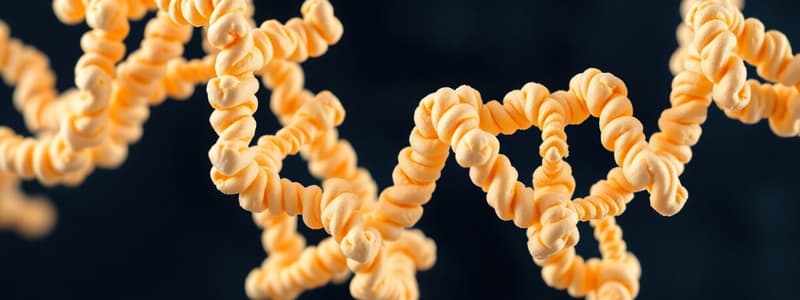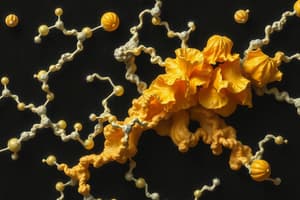Podcast
Questions and Answers
Which type of protein is considered 'low quality' and typically derived from plant sources?
Which type of protein is considered 'low quality' and typically derived from plant sources?
- Incomplete protein (correct)
- Complete protein
- Complementary protein
- High-quality protein
What is one of the functions of proteins in the body related to maintaining homeostasis?
What is one of the functions of proteins in the body related to maintaining homeostasis?
- Creating neurotransmitters
- Storing glucose
- Regulating body temperature
- Blood clotting (correct)
Which factor is NOT known to cause denaturation of proteins?
Which factor is NOT known to cause denaturation of proteins?
- High salt concentrations
- Heat
- Alcohol
- Cold temperatures (correct)
Which combination of foods exemplifies complementary proteins?
Which combination of foods exemplifies complementary proteins?
What is the primary source of complete proteins?
What is the primary source of complete proteins?
Which type of vegetarian excludes both dairy and eggs from their diet?
Which type of vegetarian excludes both dairy and eggs from their diet?
Which of the following is a reason why proteins might be used as a source of energy?
Which of the following is a reason why proteins might be used as a source of energy?
What role do proteins play in the immune system?
What role do proteins play in the immune system?
What is the RDA of protein expressed in grams for a person who weighs 70 kg?
What is the RDA of protein expressed in grams for a person who weighs 70 kg?
Which demographic is specifically mentioned as needing more protein?
Which demographic is specifically mentioned as needing more protein?
High protein diets potentially increase the risk of which health issue?
High protein diets potentially increase the risk of which health issue?
Which of the following is a consequence of excessive protein intake from animal sources?
Which of the following is a consequence of excessive protein intake from animal sources?
What percentage of calories should ideally come from protein intake?
What percentage of calories should ideally come from protein intake?
Excessive protein intake may lead to which of the following regarding bone health?
Excessive protein intake may lead to which of the following regarding bone health?
Which specific food type is indicated as associated with an increased risk of colon cancer?
Which specific food type is indicated as associated with an increased risk of colon cancer?
What is one of the severe consequences of protein deficiency mentioned?
What is one of the severe consequences of protein deficiency mentioned?
What percentage of the human body is composed of proteins?
What percentage of the human body is composed of proteins?
Which of the following correctly describes the relationship between amino acids and proteins?
Which of the following correctly describes the relationship between amino acids and proteins?
How many essential amino acids must be obtained from food?
How many essential amino acids must be obtained from food?
What is denaturation in the context of proteins?
What is denaturation in the context of proteins?
What determines the daily protein needs of an individual?
What determines the daily protein needs of an individual?
What is an incomplete protein?
What is an incomplete protein?
What effects can result from an inadequate protein intake?
What effects can result from an inadequate protein intake?
What role does the side chain of an amino acid have?
What role does the side chain of an amino acid have?
What is a common consequence of protein deficiency?
What is a common consequence of protein deficiency?
Which symptom is specifically associated with marasmus?
Which symptom is specifically associated with marasmus?
In Kwashiorkor, what is a typical dietary issue?
In Kwashiorkor, what is a typical dietary issue?
What is the initial step in the treatment of severe protein deficiency?
What is the initial step in the treatment of severe protein deficiency?
Which of the following is NOT a symptom of Kwashiorkor?
Which of the following is NOT a symptom of Kwashiorkor?
Which complication can arise from untreated protein deficiency?
Which complication can arise from untreated protein deficiency?
What characterizes the diet leading to Kwashiorkor?
What characterizes the diet leading to Kwashiorkor?
Which of the following statements about marasmus is correct?
Which of the following statements about marasmus is correct?
Flashcards are hidden until you start studying
Study Notes
What is Protein?
- Large complex molecules composed of amino acids
- Amino acids are commonly called protein's building blocks
- Amino acids are composed of carbon, hydrogen, oxygen, and nitrogen
- Some amino acids also contain sulfur
Amino Acids
- All amino acids have the same simple chemical backbone
- Each amino acid also has a distinctive chemical side chain attached
- The side chains make the amino acids differ in size, shape, and electrical charge
Essential vs. Non-essential Amino Acids
- There are 20 different amino acids used to make proteins
- 11 non-essential amino acids are produced by the body
- 9 essential amino acids must be obtained from food
Types of Proteins in Food
- Incomplete protein: does not contain all essential amino acids and is considered “low quality” protein
- Complete protein: contains sufficient amounts of all 9 essential amino acids and is considered a “high quality” protein
- Complementary proteins: two protein sources that together supply all 9 essential amino acids
Best Sources of Protein
- Animal sources: meat, poultry, fish, eggs, dairy products
- Plant sources: beans, lentils, tofu, nuts, seeds, quinoa
Functions of Proteins in the Body
- Maintain body tissues and wound healing
- Functions as enzymes and hormones
- Help maintain acid-base balance (pH)
- Blood clotting
- Gene regulation
- Assist the immune system
- Balance the Fluid
- Make Antibodies to protect against disease
- Serve as a source of energy when necessary
Protein Digestion and Absorption
- The process begins in the stomach
- Stomach acid denatures proteins
- further digestion occurs in the small intestine
Role of Proteins in Foods: Denaturation
- Refers to the physical changes that take place in protein exposed to abnormal conditions in the environment
- Denaturing of proteins happens during food preparation (cooking, whipping, adding acids) or digestion (in the stomach with hydrochloric acid).
- Factors that cause denaturation: heat, acids, bases, alcohol, high salt concentrations
Types of Vegetarians
- Lacto-ovo: eats dairy products and eggs
- Lacto-vegetarian: eats dairy products, but not eggs
- Ovo-vegetarian: eats eggs, but not dairy products
- Vegan: does not eat dairy, eggs, or any type of animal product or by-product
How Much Protein Should We Eat?
- Recommended Dietary Allowance (RDA) is 0.8 grams of protein per kilogram of body weight
- Athletes may need slightly more protein (1.2-1.7 g/kg)
- 10% to 35% of calories should come from protein
Factors that Determine Protein Needs
- Age
- Gender
- Health status
- Body Size
- Activity level
Protein Deficiency & Excess
- Health Consequences of Too Much Protein in the Diet: high cholesterol, potential bone loss, kidney disease, colon cancer
- Health Consequences of Too Little Protein: cells lining the GI tract are not sufficiently replaced, digestive function is inhibited, absorption of food is reduced, immune system cannot fight infection
Two Common Forms of Protein Deficiency
- Marasmus - severe wasting of muscle tissue, stunted growth, anemia
- Kwashiorkor - swelling of the feet and abdomen, poor skin health, poor growth and development, hair loss
Protein Deficiency Treatments
- Medical and nutritional treatment can dramatically reduce mortality rate
- Treatment Steps: address life-threatening factors, restore depleted tissue, transition to foods and introduce physical activity
Studying That Suits You
Use AI to generate personalized quizzes and flashcards to suit your learning preferences.




